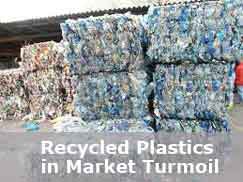There have been a variety of reports over the last six months or so on how the dramatic drop in oil and gasoline/diesel fuel costs have changed in many cases the economics of switching to alternative fuel sources.
The same phenomenon is now happening in the recycling arena, where falling prices for new materials are pushing out recycled products. As the recycling business becomes a loser, it raises the likelihood for now at least that many materials will instead be heading towards the landfill.
Take a material such as polyethylene terephthalate, or PET, used to make soft-drink and water bottles. At the beginning of 2015, new materials cost about 83 cents a pound, a level some 15% higher than the cost of recycled PET.
That situation has changed. The cost of new PET has now fallen to just 67 cents a pound, or 7% less than the recycled form, which costs 72 cents and is less desirable. The market for recycled PET is collapsing as a result.
There is panic in the air.
"Many in the recycling industry are hanging by the skin of their teeth," Chris Collier, a director at recycler CCK Group, told the Wall Street Journal this week. "Everybody is desperately chasing for money to stay alive."
Falling oil and natural gas prices of course eventually result in lower prices for materials based on them, such as most plastics. But prices for paper, metals and some other commodities are also falling, adding pressure in those markets too.
The Wall Street Journal says the most affected are the middlemen who buy used bottles, cans, paper and other items and then sort and bale the recyclables for resale. The sell price for these bales of plastics has plummeted by as much as half in just the past few months in a sector where margins are thin in the best of times.
Businesses which sell materials they have generated for recycling obviously could be affected, as they may find there are no recycler who wants to take to the waste.
Indeed, it would seem that companies that are on a path towards zero landfill waste from manufacturing or distribution facilities, such as Unilever (see The Time is Now for Zero Waste Operations, Unilever Supply Chain Chief Says), probably assumed that a market for materials for recycling would always exist – but what if it disappears for awhile?
 US cities are feeling the pain, and in some cases may have to move to putting plastic bottles and newspapers back in landfills, or perhaps paying a recycler to take the material off their hands, rather than selling the stuff for a small profit. US cities are feeling the pain, and in some cases may have to move to putting plastic bottles and newspapers back in landfills, or perhaps paying a recycler to take the material off their hands, rather than selling the stuff for a small profit.
The issue is a global one. The Wall Street Journal reports that two German recyclers have gone bankrupt since the end pf last year, and that ECO Plastics, a UK firm that in 2012 said that it was opening of what it called "the world's largest plastics processing facility," recently went into administration, a form of bankruptcy.
Chris Dow, CEO of Closed Loop Recycling Ltd in the UK, notes that "We are basically saying to our customers: 'Help us come through this by paying a premium for recycled plastic.' But few are."
The Wall Street Journal also quotes Anne Freer, a director at UK bottle maker Measom Freer, that as the price of new plastic is has come way down, her firm is using more virgin material in its products.
"People are just not willing to pay a higher price for the eco-friendly stuff," Freer said. "We try to use as much recycled as possible, but it really comes down to price."
Are you seeing this kind of turmoil in recycling markets? How do you see it playing out? Let us know your thoughts at the Feedback button below.

TheGreenSupplyChain.com is now Twittering! Follow us at www.twitter.com/greenscm
|